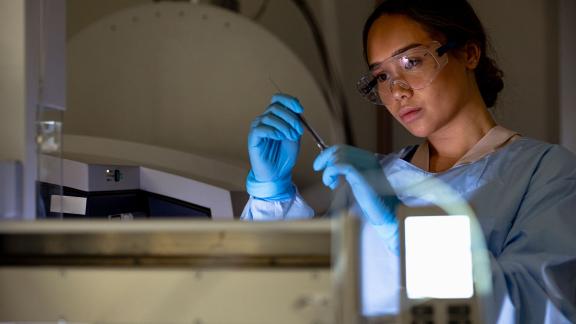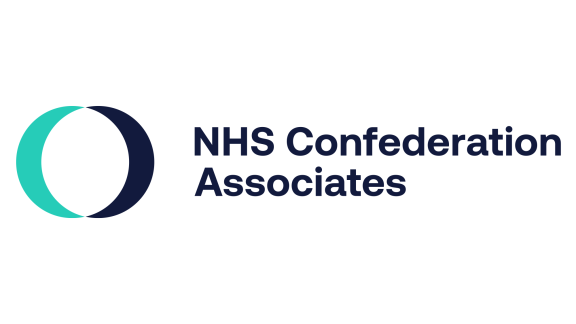What does the UK’s association to Horizon Europe mean for the NHS?
Key points
On 4 December 2023 the UK government and European Commission reached an agreement that means UK organisations can bid into the EU’s Horizon Europe research and innovation programme, certain that all successful UK applicants will be covered through the UK’s association (or through the UK Horizon Europe Guarantee) for the remainder of Horizon Europe.
This research programme is very important to the NHS in terms of research funding and opportunity, which is why the NHS Confederation’s European Office has called for participation in Horizon Europe since the decision was made for the UK to leave the EU.
For calls in the Horizon Europe 2024 Work Programme onwards, UK-based organisations including the NHS will become eligible to receive funding from the Horizon £80 billion funding pot.
It will also become possible for UK organisations to lead research projects involving multinational consortia.
Horizon funding is available through three ‘pillars’ that range from individual doctoral fellowships, through to consortia tackling ‘global challenges’, with health a feature of all three funding pillars.

Overview
On 4 December 2023 the UK government reached an agreement with the European Union about the UK’s association to Horizon Europe. The UK will become an Associated Country for calls from the 2024 Work Programme onwards. This means that UK organisations can already bid into all Horizon Europe funding calls, certain that all successful UK applicants will be covered through the UK’s association (or through the UK Horizon Europe Guarantee) for the remainder of Horizon Europe.
Horizon Europe is the European Union’s (EU) flagship research and innovation programme. Running between 2021 and 2027 and worth over £80 billion (€95.5 billion), the programme is the successor to Horizon 2020, which ran between 2014 and 2020. Horizon Europe is the largest multilateral research and innovation funding programme in the world.
Horizon Europe funding is available across three funding ‘pillars’, which include calls that are open to all research and innovation fields, as well as challenge-driven calls, which must address specific topics. Thematic funding cover topics ranging from culture, creativity, and society through to agriculture and climate change. Crucially to the NHS, health is a component of Horizon Europe, and there are health research and innovation funding opportunities in all three Horizon Europe pillars. Horizon Europe has funding opportunities either for working individually or in multinational, multi-sector consortia.
Horizon Europe funds all types of organisations including academia, industry, the NHS and any other type of legal entity. Legal entities from EU Member States, Horizon Europe Associated Countries and 116 low- and middle-income countries can participate and access Horizon Europe funding. There are currently 17 Associated Countries and others may associate in the future. In the Health Work Programme, US organisations are also eligible for funding. Other countries (known as Third Countries) can participate on a self-funded basis.
Associated Countries are able to participate in the programme on the same basis as EU Member States 1 . For Third Country participants there are two key caveats: they are unable to lead EU-funded projects, and they are ineligible to receive funding from the programme, with many Third Countries establishing their own funding pots to enable participation.
The UK left the EU on 31 Jan 2020, and in the absence of formal UK association to Horizon Europe, the UK Government put in place interim arrangements, called the UK Horizon Guarantee. Under the Horizon Guarantee arrangements UK organisations have been eligible to take part in Horizon Europe projects. UK organisations have not been able to draw funding directly from the European Commission and instead had to apply to the UK Guarantee, delivered by UKRI.
The UK was unable to lead consortia projects beyond the signing of grant agreements and consortium agreements. Between the start of the programme in 2021 and the end of August 2023, the UK Guarantee has awarded over £1.35 billion to UK participants in Horizon Europe.
For funding calls in the Horizon Europe 2024 Work Programme onwards, UK-based organisations will become eligible to receive Horizon Europe funding from the European Commission. It will also become possible for UK organisations to lead research projects involving multinational consortia.
For calls in the Horizon Europe 2021, 2022 and 2023 Work Programmes, UK organisations can still participate in Horizon Europe proposals and can participate in (but not lead) successful projects. Funding for UK organisations will continue to be covered by the UK Horizon Europe guarantee.
It is important that on all Horizon Europe proposals (to all 2023 and 2024 calls), UK organisations:
- must be added to Horizon Europe proposals as a Partner (= Beneficiary) and not as an Associated Partner
- must request funding from the EU on their Horizon Europe proposal.
This applies to all Horizon Europe proposals irrespective of the work programme year or call opening/deadline date.
For any UK Horizon Europe Guarantee project already underway, the UK Horizon Europe Guarantee covers funding for the project duration.
Support accessing funding
Free support is available to all UK organisations, including NHS organisations, interested in participating in Horizon Europe from the network of UK National Contact Points (NCPs). NCPs support those interested in applying for Horizon to identify funding opportunities, connect with consortia partners, and supporting the development of funding applications. Typically, they also represent the UK at Horizon Europe programme committee meetings. These European Commission meetings with Member States and Associated Countries feed into the design and management of Horizon Europe.
Analysis
Funding
The UK was a net beneficiary to the EU’s previous research and innovation programme, Horizon 2020 (2014-2020), contributing less than the £2 billion in funding received on average each year of the programme, as well as being among the most successful and active participants. The UK participation in Horizon Europe in terms of the amount of funding received is currently lower than in Horizon 2020, which is likely to be a result of the uncertainty related to delays with the UK association. This is due to fewer proposals being submitted with UK participants, however, those proposals that are submitted continue to be successful during peer review.
Going forward, the UK will contribute £2.2 billion annually to the programme until 2027, pro-rated to reflect the three years that it has not been able to access funding. In addition to this prorated contribution, an ‘underperformance clause’ will be automatically triggered if UK applicants receive funding 16 per cent lower than UK contributions.
Scale of the opportunity for the NHS
Horizon Europe is clustered into three ‘pillars’ covering Excellent Science, Global Challenges, and Innovative Europe. All three pillars of Horizon funding offer opportunities for the NHS, and all three are available for applications.
Pillar one: Excellent science
Pillar one of Horizon Europe is worth €25 billion in funding, and consists of three components:
- The European Research Council (ERC) has €16 billion to fund frontier research by the best researchers and their teams and is open to all research fields. Designed to be ‘bottom-up’, applicants for these funding awards are encouraged to define the scope of their research proposals themselves.
- Marie Skłodowska-Curie Actions (MSCA) have €6.6 billion of funding and are also ‘bottom-up’, so open to all research fields. MSCAs fund doctoral training networks, post-doctoral fellowships and staff exchanges.
- Research Infrastructures has €2.4 billion of funding for integrating and inter-connecting world-class research infrastructures. The majority of research infrastructure funding is ‘top-down’ in specified research areas.
Awards are open to all types of organisation, and applications can range in scale from individual fellowships through to large-scale projects opening, integrating and interconnecting research infrastructures.
Pillar two: Global challenges and European industrial competitiveness
Constituting over 50 per cent of Horizon Europe’s total budget, €53.8 billion, pillar two funds projects tackling a set of global challenges. These global challenges cover six ‘clusters’:
- Health.
- Culture, creativity and inclusive society.
- Civil security for society.
- Digital, industry and space.
- Climate, energy and mobility.
- Food, bioeconomy, natural resources, agriculture and environment.
Within each cluster, documents called work programmes list numerous call topics. Each call topic is ‘top-down’, so outlines the challenge and specifies the problem to be solved.
The main cluster of interest to the NHS is the health cluster. Amounting to €8.3 billion of funding over seven years, funding opportunities under the health cluster are set out over multi-annual work programmes (currently 2023-2024) with areas of funding opprtunities covering:
- health throughout the life course
- environmental and social health determinants
- non-communicable and rare diseases
- infectious diseases including poverty-related and neglected diseases
- tools, technologies and digital solutions for health and care including personalised medicine
- healthcare systems.
There are also a number of other funding opportunities relating to the health cluster. The Cancer Mission funds research and innovation on cancer. There are funding calls issued by health partnerships such as the Innovative Health Initiative (IHI) and Global Health EDCTP3 (European and Developing Countries Clinical Trials Partnership). Under the current transition arrangements, UK organisations can already take part in IHI and EDCTP3 calls. There are also a range of ‘co-funded’ partnerships, which combine funding from the European Commission and from other countries. For these co-funded partnerships, eligibility rules (in terms of which countries and types of organisations can be funded) are defined on a call-by-call basis. Horizon Europe co-funded partnerships include transforming health and care systems, personalised medicine, rare diseases, one health anti-microbial resistance, pandemic preparedness, and brain health. Interest for NHS organisations under pillar two may not be limited to the health cluster, with opportunities also possible under the digital, climate, energy, and mobility clusters too.
The value of funding available through the pillar two cluster (not specifically related to health) ranges from £1 million through to tens of millions, with most funding available ranging from £4 million to £20 million.
Additionally, as a result of full UK association to Horizon Europe, UK National Contact Points will be able to shape future multi-annual work programmes and NHS organisations can raise area of interest through the NCPs.
Pillar three: Innovative Europe
Supporting higher-risk applications and constituting €13.6 billion in funding, pillar three supports innovations including from innovative SMEs (small and medium-size enterprises) that are at an advanced stage of development and offer high potential, but whose innovations are not yet commercially viable. The funding available through pillar three includes support intended to provide them with the final support needed to take their innovation to market.
Delivered through the European Innovation Council (EIC), European Innovation Ecosystems and European Institute of Innovation and Technology, 70 per cent of funding delivered through pillar three is earmarked for SMEs and is expected to predominantly (but not exclusively) fund single-organisation funding bids.
The European Innovation Council has three funding schemes: the EIC Pathfinder (for technology readiness levels 1-4); the EIC Transition (for technology readiness levels 3-6); and the EIC accelerator (for technology readiness levels 6-9). The UK association agreement covers most of the EIC funding. However, UK organisations will not be able to access the EIC Fund, which is the equity part of EIC Accelerator funding scheme.
Impact of delayed association
One of the advantages of Horizon Europe is that it is a seven-year programme with calls for proposals issued between 2021 and 2027. Horizon Europe funds multi-year projects (typically three-to-five years long) so projects starting in 2027 can run well beyond that year.
However, due to the uncertainty about the UK’s full association for the last 2.5 years, although the success rate for proposals involving UK participants has remained strong, the percentage of Horizon proposals and projects with UK participation is significantly lower than during the previous seven-year programme, Horizon 2020. With the recent announcement about UK association to Horizon Europe, it is hoped that the UK participation in Horizon Europe projects will increase again and Horizon Europe still has plenty of funding opportunities over the coming years.
How the NHS Confederation has contributed
Through its NHS European Office, the NHS Confederation has called for participation in Horizon Europe since the decision was made for the UK to leave the EU. We did this because this research programme is incredibly important to the NHS in terms of research funding and research opportunity, including international collaboration.
The NHS Confederation also participated in the Stick to Science campaign, which urged the EU, UK and Swiss governments to reach agreement on how to achieve an open and barrier-free European research and innovation environment, including through Horizon Europe.
Furthermore, through the European Health Stakeholder Group, convened by HOPE and supported by the NHS Confederation, we have worked to bring together the European health community in a united call for the UK’s association to Horizon Europe to be formalised, emphasising throughout that research has always benefited from cross-border collaboration.
The NHS Confederation is also a partner in the Transforming Health and Care Systems partnership which focuses on ‘enabling health and care systems transformation through research and innovation’. It has workstreams that focus on building innovation transformation ecosystems; bridging the gap between research (which can come from NHS organisations) to policy; supporting the translation of innovations from one setting to another; identifying the topics which should be prioritised for future research; and supporting peer learning from health and care systems across the programme. The NHS Confederation acts as England, Northern Ireland and Wales’s representative on the programme, feeding into activities and deliverables and provides an avenue for UK funding bodies to potentially participate in the programme’s funding calls in the future.
Key actions for members
- Find out about Horizon Europe via the UK Horizon Europe website and EU’s Horizon Europe website.
- Reach out to relevant UK National Contact Points (NCP) to find out about funding opportunities and for support and advice.
- Sign up for the UK NCP newsletters to stay up to date about Horizon Europe funding opportunities, news and events.
- Take part in UK NCP and European Commission webinars on call topics as well as partnership-building events.
More information
- Sign up for the UK NCP newsletters to stay up to date about Horizon Europe funding opportunities, news and events.
- UK NCPs will be hosting a number of webinars to support UK participation in Horizon. To find out more, contact the UK NCPs for health: Jo Frost (jo.frost@iuk.ukri.org) and Tristan Fancourt (tristan.fancourt@mrc.ukri.org).
- A full list of UK NCPs is available on the Gov.uk website.
- Further information on Horizon Europe and on the UK’s Association to Horizon Europe is available on the Horizon Europe website.
Footnotes
- 1. the European Innovation Council (EIC) Fund, which is the equity part of EIC Accelerator; plus very exceptional cases if the eligibility for individual funding calls is limited in the Work Programme to EU Member States or certain other countries. ↑



